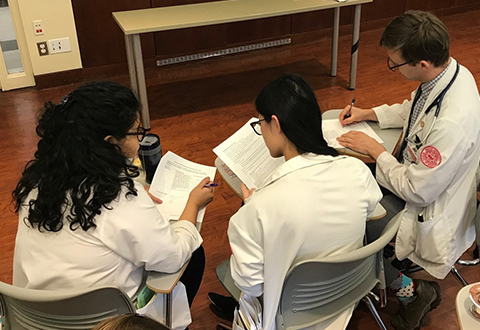Attention A T users. To access the menus on this page please perform the following steps.
1. Please switch auto forms mode to off.
2. Hit enter to expand a main menu option (Health, Benefits, etc).
3. To enter and activate the submenu links, hit the down arrow.
You will now be able to tab or arrow up or down through the submenu options to access/activate the submenu links.
Locator
Contact
Search
Bedford VA team improves BCA for Vets

Third-year medical students in the “Simulated Clinical Encounters” bedside cardiac assessment activity at Chobanian & Avedisian Boston University School of Medicine, an academic affiliate of VA Bedford Healthcare System. Photo by Dr. James Meisel, Associate Chief of Staff for Education, VA Bedford Healthcare System.
By Cheryl Whitney is the Public Affairs Officer for the VHA Office of Academic Affiliations
Friday, February 9, 2024
BEDFORD, Mass. – Leading educational researchers from Boston University Chobanian & Avedisian School of Medicine and other institutions, and physicians from VA Bedford Healthcare System recently developed a curriculum to improve bedside cardiac assessment (BCA).
BCA activities include gathering a patient’s medical history, performing a physical examination, and determining the need for diagnostic testing.
The team developed the curriculum to provide an education tool to help medical educators reverse a cycle of deteriorating bedside cardiac assessment clinical skills and foster diagnostic reasoning and patient-centered communication abilities.
The clinical skills taught in the curriculum titled, “Listen Before You Auscultate,” encourage the learner to not only auscultate (a medical term meaning, “listen to the heart with a stethoscope”) but first to listen to the patient and what brought them to seek medical care.
According to Dr. James Meisel, associate chief of staff for education at VA Bedford Healthcare System and project lead, in the first of the two-year pilot, the approach was taught to 268 medical students rotating through internal medicine clerkships at four U.S. and international medical schools.
“Our goal was to improve BCA teaching and learning by developing a high-quality, patient-centered curriculum that could be flexibly implemented and accessible to learners across health professions,” said Meisel. “Additionally, the curriculum is applicable to other health professions education programs, including nurse practitioner and physician associate programs. We hope that educators in less-resourced learning environments will find it especially helpful.”
Meisel often hears back from prior trainees notating the positive effects of having learned the core clinical skill.
Dr. Elvis Espero, Meisel’s former resident and now a psychiatrist with VA, reflected on the approach and how it has affected his patients over the years. “Not only did it provide a boost of confidence when approaching my patients, the approach allowed me to identify different heart sounds and provide appropriate care,” said Espero.
Espero noted that though there are alternative ways to learn about the implication of heart sounds, this approach “made it easier to recognize and conceptualize their physiology and pathophysiology.”
Working with Dr. Meisel on the curriculum was Dr. Ahmed Nahas, Meisel’s former geriatric fellow. At VA Bedford Healthcare System, BCA became one of Nahas’ research projects and his training helped propel the "Listen Before You Auscultate" project forward, with Nahas ultimately joining the BCA team to become coauthor on the project.
Meisel encourages other investigators to explore whether integration of the curriculum modules with point-of-care ultrasound training could improve learners’ history-taking, examination, patient-centered communication, and diagnostic reasoning abilities.
MedEdPORTAL, a journal by the Association of American Medical Colleges (AAMC), recently published the findings as well as the free resource available for download.
The mission of training future health professionals for VA and the Nation, established more than 78 years ago, is one of VA’s four statutory missions and is overseen by the Office of Academic Affiliations. More than 120,000 health professions trainees in over 60 clinical disciplines train at VA each year as they care for Veterans.































